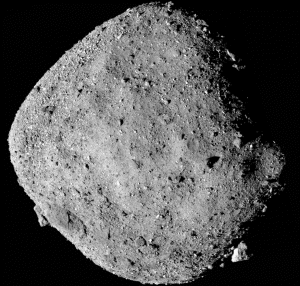NASA probe leaking asteroid samples after hearty collection
 Send a link to a friend
Send a link to a friend
 [October 24, 2020]
By Joey Roulette [October 24, 2020]
By Joey Roulette
WASHINGTON, D.C. (Reuters) - The U.S. probe
that collected a sample from an asteroid earlier this week retrieved so
much material that a rock is wedged in the container door, allowing
rocks to spill back out into space, NASA officials said on Friday.
The robotic arm of the probe, OSIRIS-REx, on Tuesday night kicked up a
debris cloud of rocks on Bennu, a skyscraper-sized asteroid some 200
million miles (320 million km) from Earth and trapped the material in a
collection device for the return to Earth.
But images of the spacecraft's collection head beamed back to ground
control revealed it had caught more material than scientists anticipated
and was spewing an excess of flaky asteroid rocks into space.
The leakage had the OSIRIS-REx mission team scrambling to stow the
collection device to prevent additional spillage."Time is of the
essence," Thomas Zurbuchen, NASA’s associate administrator for science,
told reporters. Zurbuchen said mission teams will skip their chance to
measure how much material they collected as originally planned and
proceed to the stow phase, a fragile process of tucking the sample
collection container in a safe position within the spacecraft without
jostling out more valuable material.NASA will not know how much material
it collected until the sample capsule returns in 2023. The
troubleshooting also led mission leaders to forgo any more chances of
redoing a collection attempt and instead commit to begin the
spacecraft’s return to Earth next March. "Quite honestly, we could not
have performed a better collection experiment," OSIRIS-REx principle
investigator Dante Lauretta told reporters, affirming a hearty sample
size.
[to top of second column]
|

This mosaic image of asteroid Bennu, composed of 12 PolyCam images
collected on December 2, 2018 by the OSIRIS-REx spacecraft from a
range of 15 miles (24 km). NASA/Goddard/University of
Arizona/Handout via REUTERS

But with the door lodged open by a rock and the "concerning" images
of sample spillage, "we're almost the victim of our own success
here," he added. The roughly $800 million, minivan-sized OSIRIS-REx
spacecraft, built by Lockheed Martin, launched in 2016 to grab and
return the first U.S. sample of pristine asteroid materials. Japan
is the only other country to have accomplished such a feat.Asteroids
are among the leftover debris from the solar system’s formation some
4.5 billion years ago. A sample could hold clues to the origins of
life on Earth, scientists say.

(Reporting by Joey Roulette in Washington, D.C.; Editing by Dan
Whitcomb and William Mallard)
[© 2020 Thomson Reuters. All rights
reserved.] Copyright 2020 Reuters. All rights reserved. This material may not be published,
broadcast, rewritten or redistributed.
Thompson Reuters is solely responsible for this content. |